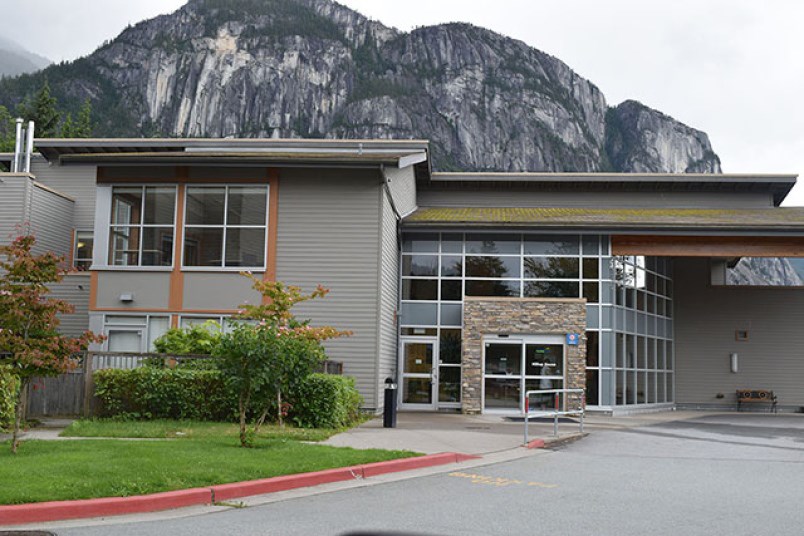Many around С����Ƶ, including in Squamish, are joining their voices in a call for changes to long-term care, particularly when it comes to visitations during COVID-19.
The pandemic has hit long-term care homes especially hard.
On March 7, the first COVID-19 outbreak in Canada was declared in a North Vancouver care home. By March 9, the home saw the first death from COVID-19 in Canada.
The World Health Organization declared it a global pandemic on March 11.
In November, the Office of the Seniors Advocate of С����Ƶ released a gut-wrenching report that came out of a survey: "Staying apart to stay safe: the impact of visit restrictions on long-term care and assisted living survey."
The 15,000 survey respondents were people in care or those who love them.����
"The large majority of respondents — both residents and families — reported that the current visitor restrictions are not working for them and some referred to them as inhumane."

What are the rules at Hilltop House
At Squamish's Hilltop House, where there are 85 long-term care beds, each resident and the designated visitor has one two-hour visit per week and as many window and/or virtual visits as can be managed from a staffing perspective.
Visitation can happen in a resident's private bedroom, or in garden areas.
"We do not permit visitation in the common areas. We also permit, in most instances, unlimited compassionate visits for residents/families who require more acute support. Lastly, we allow for end of life visitation as required," wrote a Vancouver Coastal Health spokesperson in an email to The Chief.
Hilltop House provides 3.36 hours of staff time per resident per day, which is in line with the standards set out by the Ministry of Health.
What many families in the advocate's survey noted was that the rules are not consistent from facility to facility in С����Ƶ This leads to confusion and upset among families and residents.
"It is the same virus and it is the same set of public health orders, so why are these differences being felt in care homes?" provincial seniors advocate Isobel Mackenzie said in an interview with The Chief. "I think that the public health orders are fairly broad and that is seen as a fairly good thing in one way — but what has happened in practice is that they have been very narrowly interpreted by most people,"
She added that the public health orders don't restrict how frequently or where the visits can happen.
The only restriction is that there can only be one designated social visitor.
"That is not the way the majority of care homes have interpreted this," she said.
Each VCH site sets out its own visitation access depending on resources that are available and also the physical layout of the building, the health authority spokeswoman told The Chief.
There have been no outbreaks in any long-term care homes in Squamish since the pandemic began.
A COVID-19 outbreak has not been declared to date at Hilltop House, the spokeswoman confirmed.
The number of residents who have moved out during COVID-19 across VCH facilities is not tracked by the health authority.
Families For Change is a group of about 260 people, with some members in Squamish, that is lobbying for changes to long-term care across the province.
Specific to visitations during COVID-19, members of the group who The Chief spoke to are asking for more access to their loved ones and consistency across the province from facility to facility.
Janice Brown is one of the members. Her mother is at Hilltop House and while she has concerns about other aspects of her mother's care, she said Hilltop has some of the better visitation rules in the province, as far as she can tell.
All of the families The Chief spoke to said they would like more access to their loved one.
A provincial issue
Lynda Bennett, whose 84-year-old dad, Barry Ibbott, is in care in Nanaimo in Island Health. She said she feels really blessed with the home her father is in. The administration and staff consult her to make things work, she said.
"That doesn't change the fact that isolation has taken my dad down and out," she said.
She sees him twice a week for 40 minutes in his room.
"The hard part is when 40 minutes is up, that is it. You have to leave," she said. "That is really hard for my dad to understand — how in mid-conversation, do I have to go?"
He transferred from a care home in White Rock to Nanaimo during the pandemic, which turned into a blessing, because she has more access to him at this home.
Her dad has Parkinson's and the family was paying for private physiotherapy, but that isn't happening due to the pandemic.
"Anything that the family was doing or bringing in from the outside is still shut off," Ibbott said.
The issue, as she sees it, is the interpretation of the rules across the province.
"How can my care home allow certain things and other care homes are still not allowed to hug?" Ibbott said, though she is allowed to hug her dad while visiting him.
She said she is considered a social visitor, not an essential visitor. But because only one person can be designated, if she can't go see her dad or becomes sick, there is no one else allowed.
"We shouldn't have to fight through hoops to be called essential," Ibbott said. "Every person in long-term care should have one person.... and a backup designated person who can come in. And essential means we should be able to come in daily?"
She questions how family members are different than the caregivers who work at these homes.
"They come in daily. They get temperature checked, they get to answer all the COVID questions and they still get to go out and go to Costco at night. We are not different than the caregivers in terms of risk or the ability to control us."
She thinks if more family were allowed in as essential visitors, that would lighten the load on the health care workers.
She also wishes she could take her dad for a drive.
"Why does he have to stay locked up?"
Her main role right now is keeping her very lonely dad from giving up hope.
Dianna Green, 57, lives in a long-term care home in Cranbrook which is within the Interior Health authority.
She lives in Joseph Creek Care Village and said visitations there are more lenient than on the coast.
She is mobile with an electric wheelchair and can go out to town, with COVID-19 precautions such as masks.
Her issue is more with the provincial rules than her particular home.
She is allowed one essential visitor and a few times a week for an hour or so, and it always has to be the same person.
She said she feels she is losing touch with all her friends, it has been so long since she could have other visitors.
"It has been so long, since March," she said, adding that pre-pandemic she would have a friend to visit two or three times per week.
"It is really hard. Just not having that human contact and friends to really pour your heart out to."
She said just seeing people, however kind, who are paid to take care of you is very different than contact with loved ones.
She said she finds comfort and hope in her faith.
She would like to see things open up more.
"Most of [the residents] me included, they aren't going to live for another 20 years, 10 years. We don't have much longer on the earth and you want to spend that with your loved ones," she said.
In response to a question of what the government has to say to those who say they would like to spend their last days, months, or years seeing their loved ones, the Ministry of Health told The Chief there is more to consider.
"Outbreaks can spread rapidly in care homes and it’s not just individuals we need to be concerned about, but the collective risk to everyone living in a facility. Finding that balance of protecting our seniors and elders while lessening any negative impact associated with being apart from family and friends has been one of the most challenging thing[s] that we have been faced with, knowing that this virus can be so devastating in care homes," reads the Ministry's statement. "We understand how challenging this is [for] families and loved ones of seniors in care homes. We are working with care home operators and staff to determine what measures need to be put in place to support increased visitation in these facilities. However, even with increased measures, we need to be cautious."
Since the advocate's report came out, pandemic numbers have spiked.
Mackenzie told The Chief, however, that while the idea of opening up to more different visitors isn't likely when the numbers are high, that is just one of the recommendations.
"The first recommendation that we can be working on because it is not going to significantly increase the risk and that is around the current visitors who are going in because we know that is not how the virus is getting in," she said. "The current visitors going in need to have more meaningful private visits with their loved ones. The attention needs to be focussed on achieving that."
She said she expects that any changes to public health orders are not going to come until the vaccinations have been administered in care homes, something she anticipates happening in the next eight weeks.
The Ministry told The Chief that it is taking the report and its recommendations to heart.
"The ministry is committed to making every effort to try and increase the amount of visitation that can take place safely. This includes working with the health authorities and operators to mitigate the risk to residents and staff of care homes. The seniors advocate recommendations also help inform our ongoing review of visitation in long-term care and assisted living."
Family advocacy?
Another recommendation of the report is for organizations that allow families to collectively advocate for their loved ones.
"The general theme that family members are concerned that if they... 'make a fuss,' that the operator — who now has tremendous control because they can decide if you get to visit and so on — I do hear that. The degree to which that is actually materializing, I don't know," Mackenzie said. "Families are worried because, at the end of the day, the ability to see their mom or their husband is in the hands of a care home operator right now."
The report recommends the creation of a Long-Term Care and Assisted Living Resident and Family Council Association at a provincial level.
"Because I think that is a place where family members could raise issues that could be dealt with in a more anonymous way and might give them more comfort."
In response to The Chief's question about this, the Ministry said it is looking at a "variety of options to strengthen the role and voice of Family Councils. The Office of the Seniors Advocate proposal on creating a Family Council Association is one of the options being considered."
Mackenzie said she knows staff at care homes can also be nervous about raising issues.
That hesitation can be remedied to some extent by getting care staff covered under provincial whistleblowers protection, which they aren't currently, she said.
Only provincial government employees are covered under this protection.
Overall, she said what the survey showed was the extent to which family members and loved ones are involved in the care of residents.
"It spoke to the degree to which a portion of family members are very significant care partners to their loved ones and the degree to which they were involved in the life of their loved one, pre-COVID and the degree to which that has now been severely restricted," she said.

Staff shortages being addressed
Mackenzie said that there are issues around staffing that should be resolved in time.
Staffing shortages during COVID are exacerbated by the low threshold for calling in sick. Workers are not to come in even with a headache, to ensure COVID-19 is not inadvertently spread.
"So, we actually should see increased sick leave and absenteeism," she said.
There are also staff required to isolate or quarantine.
"So, you now have people who have had exposure through a close contact so they have to go and isolate for 14 days, sometimes," Mackenzie said.
With the large number of care homes in outbreak, that also puts a huge strain on staffing.
"Because now you need more staff because when you are in [an] outbreak, you are dealing with isolating some of the residents to their rooms... so you have that added complexity."
The order for staff to stay at one site, rather than working from site to site, is "a good thing," Mackenzie said, "but what it has done is it has put pressure on the casual pool."
Homes need casual workers for vacations and sick days, she noted.
"Usually people who are in a casual pool, work for a number of employers... That has dried up, because of the single-site order."
This has all led to layers of pressure.
"I can believe that the staffing [issue] is quite acute during COVID."
She said a year from now, post-pandemic, she said she thinks many of the staffing issues will have been resolved, and she acknowledged that the government has been working hard to resolve it. It takes at least six months to train a care-aide, she noted.
The Ministry told The Chief that during the COVID-19 pandemic, the government has invested $120 million to hire more staff.
So far, 826 full-time staff have been hired in facilities "to support safe visitation and infection prevention control."
As of Dec. 8, the government has received almost 9,000 expressions of interest in the Health Career Access Program (HCAP)�� and nearly 5,000 of those have gone through their preliminary interview and screening process and over 4,300 participants have entered the Pneumonia HCAP pool after clearing a preliminary criminal record check. *
The Ministry is now working with health authorities and operators to allocate these resources to facilities across the province.
Mackenzie said that if there is any silver lining to all the suffering and deaths in care homes due to the pandemic, it is momentum and desire to change things in these facilities for the better.
"I don't know how long we will sustain this, once COVID is behind us, because there is a big bill to pay," she said. "[But] I think there has been an awakening in the general public about long-term care that wasn't there before."
The fix for care homes in general, she said is more staffing that is appropriate, single rooms and smaller-scale settings.��
"That is going to cost more money," she said, adding some of us are going to have to pay more tax to achieve the long-term care realities that we want to see.
*Please note, this story has been corrected. In one instance, we incorrectly wrote Health Care-Associated Pneumonia when we meant����Health Career Access Program for HCAP.
by on Scribd



